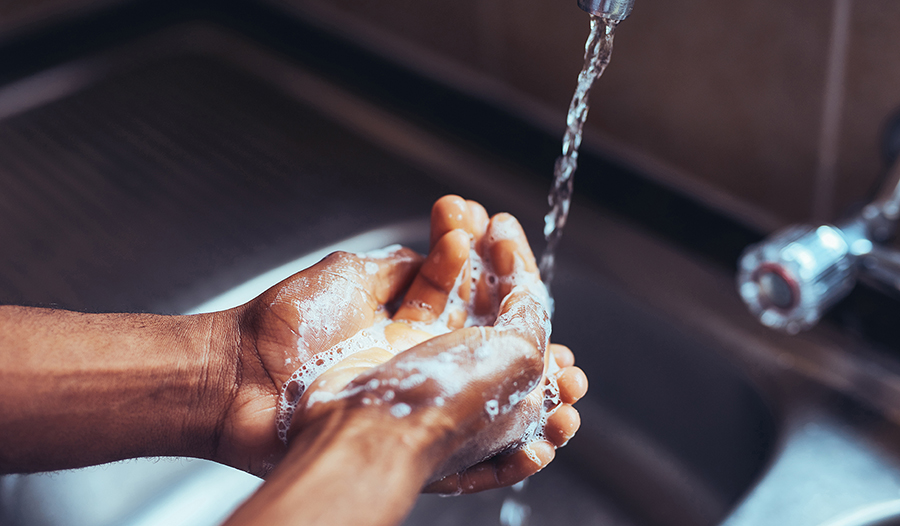5 Health Practices That Are Here To Stay In The New Normal

The worldwide lockdown provided many people with more free time, and we have been continuously reminded of our daily hygiene habits. Now that mandates are being lifted and locations are reopening, it is more important than ever to maintain these habits in order to stay on top of our health. Here are some ways to maintain good health practices as we go back to our normal routines.
1. Mindful Nutrition
With people spending more time at home, eating in has gained popularity. Grocery and meal prep delivery services make it more convenient to prepare food at home. As we return to our regular schedules, it is tempting to go back to old habits of eating out or skipping meals.
According to the United States Department of Agriculture, eating meals out may increase total caloric intake by several hundred calories, most of which come from sugar and fats. Those who want to maintain a healthy diet but also who need the speed and convenience as they return to a normal schedule have some alternate options.
Protein powders are a quick way to create quick nutrient-rich shakes on the go. Many protein powders contain whey, which is a milk byproduct. A pea-based protein powder is suitable for those who cannot consume dairy products or a paleo-friendly protein powder for those with other dietary restrictions. Protein powders can serve as quick meal replacements and a healthier alternative to eating out.
Several studies suggest that healthy gut flora may have a positive impact on our immune function. One study suggests that a diverse diet may promote a diverse gut microbiome.
Probiotics may be used to help support good bacteria in our gastrointestinal tract and may support a healthy immune system. Many probiotic strains are found in our own gut floras and work to maintain a good microbial balance. Several studies suggest probiotics may help prevent infections, inhibit H pylori grown, decrease gut inflammation, and prevent allergies.
2. Maintain a Regular Exercise Routine
Most people think of exercising to help maintain a healthy weight. In addition to this, regular exercise may help increase energy levels, provide clearer thinking, improve muscle tone, and reduce the risk of cardiovascular disease. Exercise may also help improve our mood by increasing the release of endorphins. Endorphins are chemicals released by the body to help relieve pain and stress. They give us a sense of well-being and overall positive feeling while decreasing our sense of pain.
With gyms starting to open, many people will slowly turn back to their in-gym routines. However, the lockdown caused many of us to get creative in our workouts at home. At-home workouts can be a more convenient way to stay in shape than joining a gym. Many gyms started to offer online workouts, and the internet is full of plenty of at-home workout programs, making it easier to stay motivated.
For those who need a little workout pick me up, a pre-workout powder can be a great way to give that needed boost to prepare for a workout. Studies have shown that taking a pre-workout supplement containing beta-alanine, creatine, and branch chain amino acids may show improvement in overall resistance training and body strength.
Regular exercise may also have anti-inflammatory effects and may help to support a healthy immune system, both of which are important in maintaining health and wellness.
3. Get a Good Night's Sleep
As the lockdowns lift, most of us will be returning to a normal work schedule. This is why it is especially important to maintain a healthy sleep routine. The National Sleep Institute estimates 30% of the population suffers from insomnia. Insomnia includes difficulty falling or staying asleep, and waking feeling unrested.
Sleeping less than 7 to 8 hours per night may increase the risk of obesity, cardiovascular disease, diabetes, and lowered immune function. Lack of adequate sleep may also be related to a smaller life span.
Our body’s internal clock, known as circadian rhythm, is responsible for regulating our sleep-wake cycle. This cycle is greatly influenced by melatonin — a hormone produced naturally from our pineal gland in our brain. As night time approaches, melatonin is released to help facilitate sleep.
Research suggests that taking melatonin may help increase total sleep time for those suffering from altered sleep schedules, assist with fatigue associated with jet lag, reset the body’s sleep-wake cycle, and reduce the time it takes to fall asleep in people with delayed sleep phase syndrome. If possible, talk to your doctor about any potential side effects before you add melatonin to your everyday routine.
Additionally, one study suggests that taking a warm bath 90 minutes before bed could help people fall asleep quicker. Epsom salt, which naturally contains magnesium, when added to the bath may facilitate further relaxation.
4. Dealing with Stress
Stress can harm our health in more ways than one. One Swedish study found that a stressful working environment may increase rates of insomnia in working people. It is estimated that 43% of people have adverse health effects from stress.
Stress is regulated by our adrenal glands, which are tiny glands located on top of our kidneys. They release cortisol, which is our fight or flight hormone. Chronic stress may increase the risk of weight gain, sleep issues, heart disease, and mood issues.
Eating a healthy diet, exercising regularly, and adequate sleep can all help alleviate stress. Adaptogenic herbs may also be useful in regulating the stress response and possibly provide an overall calm feeling. A 2014 study shows that ashwagandha, an Ayurvedic herb, may be useful in decreasing overall stress and anxiety. According to several studies, adaptogenic herbs including Siberian ginseng, holy basil, Rhodiola, and Schisandra may also be effective in reducing stress.
5. Build Healthy Hygiene Habits
The recent pandemic has made most of us more aware of our daily hygiene practices. As the lockdown lifts, now is an important time to maintain those daily hygiene habits in order to maintain optimal health.
Keeping our hands clean is an important daily hygiene habit that can be used to help prevent the spread of illness. Washing our hands with soap has been shown to be more effective than using water alone in removing debris and microbes from our skin. A recent study conducted by University College London suggests that moderate handwashing of 6-10 times per day may reduce the risk of contracting an infectious illness. For optimal effectiveness, it is important to follow proper handwashing etiquette.
Proper handwashing steps are included below:
- Use warm water and wet your hands thoroughly.
- Use a generous amount of soap and lather very well.
- Create friction for 20 seconds, making sure to wash between your fingers, under your fingernails, fronts and backs of your hands, wrists, and forearms.
- Rinse thoroughly under clean, running water. Use a rubbing motion.
- Dry your hands with a paper towel, clean towel, or an air dryer.
- To prevent recontamination, use a paper towel to turn off the faucet.
Although not a replacement for hand washing, hand sanitizer can be a great alternative to use when washing your hands is not an option or when your hands are not visibly soiled. Hand sanitizer typically comes in the form of a gel, wipe, or towelette. Hand sanitizer that contains and ethanol or isopropyl alcohol content of 60-95% may be more effective at killing germs.
Due to the alcohol content, frequent use of hand sanitizer may cause hand dryness, which may be alleviated with the use of hand lotion.
More than 50 countries worldwide are making face masks mandatory as lockdown restrictions lift. For places without mandatory facemask requirements, the World Health Organization recommends that any person who is feeling unwell wears a facemask to help prevent the spread of germs.
Many components make up our overall health and wellness. To keep well and safe, make sure your building and practicing these healthy habits together.
References:
- Todd, J, Mancino, L. Eating out increases daily caloric intake. June 1, 2010. https://www.ers.usda.gov/amber-waves/2010/june/eating-out-increases-daily-calorie-intake/. Accessed 6.19.2020.
- ScienceNordic. Why gut bacteria are essential for a healthy immune system. March 29, 2008. Accessed 6/19/2020.
- Heyman, M, Greenway, F. A Healthy Gastrointestinal Microbiome is Dependant on Dietary Diversity. Mol Metab. 2016 Mar 5;5(5):317-320. doi: 10.1016/j.molmet.2016.02.005. Accessed 6/19/2020.
- Zanteson, L. Gut Health and Immunity – It’s all about the good bacteria that can help fight disease. June 2012. Accessed 6/17/2020.
- Maldonado, G, Cazorla, S, Dumit, L, E. V, P, G. Beneficial Effects of Probiotic Consumption on the Immune System. Ann Nutr Metab. 2019;74:115-124. Accessed 6/16/2020.
- U.S. National Library of Medicine. Benefits of Exercise. Accessed 6/17/2020.
- Outlaw, J, Wilborn, C, Smith-Ryan, A, Hayward, S, Urbina, S, Taylor, L, Foster, C. Acute effects of a commercially-available pre-workout supplement on markers of training: a double-blind study. 6/17/2020.
- Antonio, J, Ciccone, V. The Effects of Pre Versus Post Workout Supplementation of Creatine Monohydrate on Body Composition and Strength. J Int Soc Sports Nutr. 2013 Aug 6;10:36. 6/17/2020.
- Nielson, H.G. Exercise and Immunity. May 13, 2013. doi: 10.5772/54681
- Khullar, A MD. The Role of Melatonin in the Circadian Rhythm Sleep-Wake Cycle. July 9, 2012. Accessed 6/17/2020.
- Rogers, Dr. A. Sleep and Health. Accessed 6/19/2020.
- Costello, R. Lentino C, Boyd, C, O’Connell, M, Crawford, C, Sprengel, M, Deuster, P. The effectiveness of melatonin for promoting healthy sleep: a rapid evidence assessment of the literature. Nutr J. 2014; 13:106. Accessed 6/16/2020.
- Linston, S. Does Work Stress Predict Insomnia? A Prospective Study. Br J Health Psychol. 2004 May;9 (Pt2):127-36. Accessed 6/19/2020.
- Candian Centre for Occupational Health and Safety. OSH Answers Fact Sheet. Feb 13, 2020. Accessed 6/17/2020.
- Robinson, Dr. J. The Effects of Stress on Your Body. Dec 10, 2017. Accessed 6/19/2020.
- Mayo Clinic. Chronic Stress puts your health at risk. Accessed 6/19/2020.
- Pratte, M, Nanavati, K, Young, V, Morley. Can Alternative Treatment for Anxiety: A Systematic Review of Human Trial Results Reported for the Ayurvedic Herb Ashwagandha. J Altern Complement Med. 2014 Dec 1; 20(12): 901-908. Accessed 6/16/2020.
- Haghayegh, S, Khoshnevis, S, Smolensky, M, Diller, K, Castriotta, R. Before-bedtime passive body heating by warm shower or bath to improve sleep: A systematic review ad meta-analysis. Sleep Medicine Reviews. Volume 46, August 2019, Pages 124-135. Accessed 6/19/2020.
- University College London. Handwashing 6-10 times a day linked to lower infection risk. May 22, 2020.
- Centers for Disease Control. Handwashing: Clean Hands Saves Lives. March 4, 2020. Accessed 6/18/2020.
- Reynolds, S, Levy F, Walker E. Hand Sanitizer Alert. Emerg Infect Dis. 2006 Mar; 12(3): 527-529. Accessed 6/19/2020.
- Which countries have made wearing face masks compulsory? June 3, 2020. Accessed 6/19/2020.
PENAFIAN:PUSAT KESEHATAN tidak dimaksudkan untuk memberikan diagnosis...
















































































 Daftar Isi
Daftar Isi


